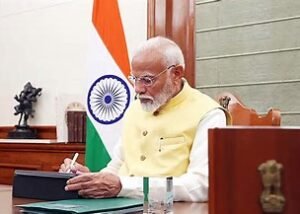Prime Minister Narendra Modi began his third term with a significant decision aimed at benefitting the agricultural sector. On Monday, just a day after being sworn in, PM Modi signed a file authorizing the release of the 17th installment of the Pradhan Mantri Kisan Samman Nidhi (PM-Kisan) funds. This decision, which involves nearly Rs 20,000 crore, will be transferred to the accounts of approximately 9.3 crore farmers across India.
A Commitment to Farmers’ Welfare
In his statement following the signing, PM Modi emphasized his government’s dedication to the welfare of farmers. “Ours is a government fully committed to ‘kisan kalyan’ (farmers’ welfare). It is, therefore, fitting that the first file signed on taking charge is related to it. We want to keep working even more for farmers and the agriculture sector in the times to come,” he said.
This move underscores the government’s ongoing commitment to supporting farmers, reflecting its broader strategy to address the needs of the agricultural community. The PM-Kisan scheme, launched in 2019, provides financial assistance to farmers, with funds being directly transferred to their bank accounts. This installment, the 17th since the scheme’s inception, aims to provide much-needed relief and support to the farming community.
Political Implications and Reactions
The timing and nature of this decision have drawn significant attention and varied reactions. The opposition has criticized the move, suggesting that it is more of a political spectacle than a genuine effort to support farmers. Congress leader Jairam Ramesh referred to it as a “grand show,” arguing that the funds released are entitlements due to the farmers according to the government’s own policy, and not a special favor.
Political analysts also point to the recent election results as a potential motivator for this decision. Compared to the 2019 Lok Sabha elections, the BJP’s vote share in rural areas decreased by 4.5 percent in 2024, dropping from 39.5 percent to 35 percent. This decline in rural support may have influenced the timing of the PM-Kisan installment release as a strategic move to regain trust and support from the farming community.
Broader Policy Moves

In addition to the PM-Kisan funds, the first cabinet meeting of Modi’s third term included other significant decisions aimed at providing relief and support to the poor and middle class. Notably, the cabinet approved the construction of 3 crore new houses under the Pradhan Mantri Awas Yojana (PMAY). This initiative aims to provide affordable housing with essential amenities such as household toilets, LPG connections, electricity, and functional household tap connections through the convergence of various central and state government schemes.
Launched in 2015-16, PMAY has been a cornerstone of the Modi government’s efforts to enhance the “ease of living” and dignity for millions of Indians. The decision to ramp up the construction of houses under this scheme aligns with the government’s broader agenda to improve living conditions and provide sustainable housing solutions.
Strategic Government Formations
PM Modi’s third term also sees an increased representation from National Democratic Alliance (NDA) partners, with a 72-member Union Council of Ministers set to oversee various government ministries over the next five years. The new cabinet formation reflects a blend of political and social engineering aimed at ensuring effective governance and the execution of key policies.
In March, Modi chaired a key cabinet meeting, instructing his ministers to prepare an agenda for the first 100 days to ensure the smooth execution of the government’s functions. This 100-day roadmap includes significant policy implementations, particularly in the defense sector. Plans are underway to set up a new export promotion body and negotiate for the acquisition of Rafale M fighter jets. Additionally, reforms in the Defence Research and Development Organisation (DRDO) and discussions on the Agnipath military recruitment scheme are on the agenda, following insistence from BJP coalition partners Janata Dal-United and Jana Shakti Party (Ram Vilas).
Road Ahead
The Ministry of Home Affairs is also expected to play a crucial role in the coming months, overseeing the implementation of new criminal laws from July 1 and ramping up efforts to conduct assembly elections in Jammu and Kashmir by the Supreme Court’s deadline of September 30. These initiatives highlight the government’s broader agenda to enhance national security and governance.
As PM Modi embarks on his third term, the initial decisions and strategic moves reflect a blend of political acumen and a commitment to addressing the needs of various sections of society. The release of the PM-Kisan funds and the approval of new housing projects are pivotal steps that underscore the government’s focus on welfare and development. Whether these moves will translate into sustained support from the rural populace and other segments of society remains to be seen, but they undoubtedly set the tone for the administration’s priorities in the coming years.












Comments 3